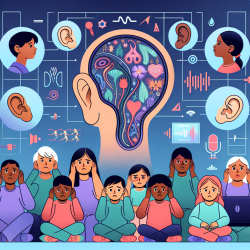Unlocking Potential: Beyond Stereotypes in Intelligence
In the realm of education and therapy, especially when working with children, it's crucial to focus on data-driven decisions rather than relying on stereotypes or generalized assumptions. The research article titled Are Jews Smarter Than Everyone Else? by Sander L. Gilman, provides a comprehensive examination of how stereotypes about intelligence have been constructed and the implications they hold for scientific and educational practices.
Understanding Intelligence Beyond Stereotypes
The article delves into the historical and cultural contexts that have led to the stereotype of Jewish intelligence. It critiques the notion of "smartiness" as a racial or ethnic trait, highlighting the dangers of using such stereotypes in scientific and educational settings. As practitioners in speech-language pathology, it is imperative to recognize the limitations and potential harm of these stereotypes.
Intelligence is a multifaceted construct that cannot be accurately captured by simplistic racial or ethnic categorizations. Instead, it is influenced by a myriad of factors including environment, education, and individual differences. As practitioners, we must focus on these factors to better support the children we work with.
Data-Driven Approaches in Speech-Language Pathology
To improve outcomes for children, it is essential to adopt data-driven approaches that are informed by empirical research rather than stereotypes. Here are some strategies to consider:
- Individualized Assessment: Each child is unique, and their assessment should reflect their individual strengths and needs. Avoid using generalized assumptions about intelligence based on race or ethnicity.
- Evidence-Based Interventions: Utilize interventions that have been proven effective through rigorous research. This ensures that the strategies employed are grounded in scientific evidence and tailored to the child's specific needs.
- Cultural Competence: Be aware of cultural influences on communication and learning. Understanding a child's cultural background can provide valuable insights into their communication style and learning preferences.
- Continuous Professional Development: Stay informed about the latest research in speech-language pathology and related fields. This ongoing learning process will enhance your ability to make informed, data-driven decisions.
Encouraging Further Research
The article by Gilman invites practitioners to question and investigate the assumptions they hold about intelligence. By engaging with current research and participating in ongoing professional development, practitioners can refine their understanding and improve their practice.
For those interested in exploring this topic further, the original research paper offers a deeper dive into the complexities of intelligence and stereotypes. To read the original research paper, please follow this link: Are Jews Smarter Than Everyone Else?
Conclusion
In conclusion, moving beyond stereotypes and embracing data-driven, individualized approaches in speech-language pathology can significantly enhance outcomes for children. By focusing on evidence-based practices and cultural competence, practitioners can unlock the full potential of every child they work with.










